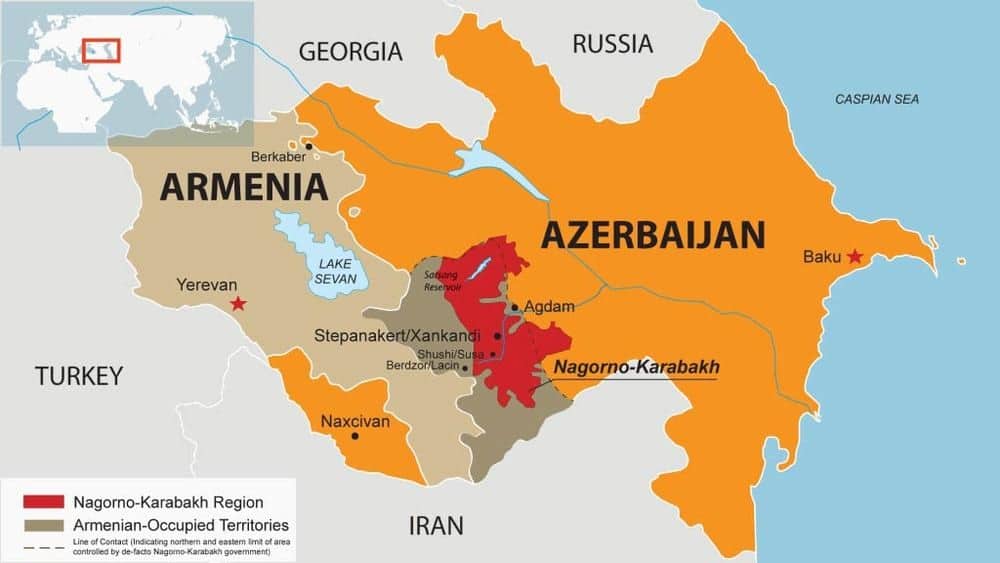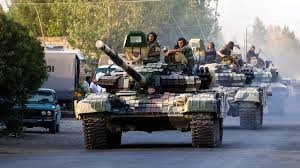Nagorno-Karabakh, a mountainous, landlocked region inside the borders of Azerbaijan, has been a source of dispute since before the creation of the Soviet Union. Tensions were suppressed when both Armenia and Azerbaijan were Soviet states, but they re-emerged as the cold war ended and Communist party control of the bloc dissolved.
Nagorno-Karabakh is recognized internationally as Azerbaijan’s territory but has a mostly Armenian population who have resisted Azerbaijani rule for more than a century. In 1991 the region of around 150,000 people declared independence and since then it has ruled itself – with Armenian support – as the unrecognized Republic of Artsakh.

A war between Armenian and Azerbaijani forces ended in a ceasefire in 1994, with Armenia in full control of Nagorno-Karabakh and other surrounding enclaves of Azerbaijan’s territory.
The border between the two is considered one of the most militarised in the world, said Laurence Broers, the Caucasus programme director at Conciliation Resources, a peace-building group.
Azerbaijan is majority Muslim and Armenia is majority Christian; it should be noted that Azerbaijan does maintains strong defence ties with Israel).
Why are they fighting now?
An Armenian revolution in 2018 ushered in a new generation of leadership who sought for a final resolution of Nagorno-Karabakh conflict. The Armenian prime minister Nikol Pashinyan’s firm handling of the issue has been perceived as provocative by the other camp – the Azerbaijani leaders.
With the Covid-19 pandemic taking a toll on the price of Azerbaijani oil and gas, it may be that its rulers have decided now is a good time to act, Broers said. “They may have thought: perhaps it’s an idea to have an operation now, rally the population around the flag, make some territorial gains and re-enter the peace process from a position of strength,” Broers said.
Azerbaijan says it is responding to Armenian aggression in areas that are legally its territory and which have been occupied by enemy troops and separatists for decades.
There are several reasons why the conflict is of international concern other than the humanitarian issue and the killing of civilians on both sides. Firstly, regional powers including Russia, Turkey and Iran are invested in the South Caucasus to varying degrees. If the fighting continues, “you could have a process of sleepwalking, as you did in the first world war, into a larger regional conflict,” Broers said.
Turkey has already declared its staunch support for Azerbaijan, while Russia is has a security alliance with Armenia, though it sells weapons to both countries. Moscow and Ankara have been jostling for influence in different theatres around the world including in Syria and Libya. Turkey is sending Syrian fighters into the area to fight on Azerbaijan’s side, and Armenia claims the Turkish air force is also fighting with Azerbaijan – a claim Baku and Ankara deny.
Several fighters in Syria’s Idlib province have told the Guardian that a Turkish private security company started a recruitment drive a month ago for men to send to Azerbaijan.
The wider South Caucasus is a crucial artery for gas and oil from Azerbaijan into Turkey and on to Europe and other world markets. Azerbaijan supplies about 5% of Europe’s gas and oil demands (helping to reduce the EU’s dependence on Russia), and fighting in 2016 came close to a number of these pipelines.
What is happening now?
Early on Sunday 27 September, Armenia announced it was declaring martial law, mobilising its army and ordering civilians to shelter. It claimed its neighbour Azerbaijan had launched a military operation inside a breakaway region called Nagorno-Karabakh. Azerbaijan said it attacked only in response to Armenian shelling.
Despite signs in the past two years of possible progress towards peace, one of Europe’s “frozen conflicts” has erupted again. Since Sunday, forces from Nagorno-Karabakh along with the Armenian military have been fighting Azerbaijani troops, armour and aircraft. At least 400 people have been killed including civilians, and hundreds more are said to be injured. Azerbaijan has claimed to have taken territory inside Nagorno-Karabakh, a claim the Armenians dispute.

